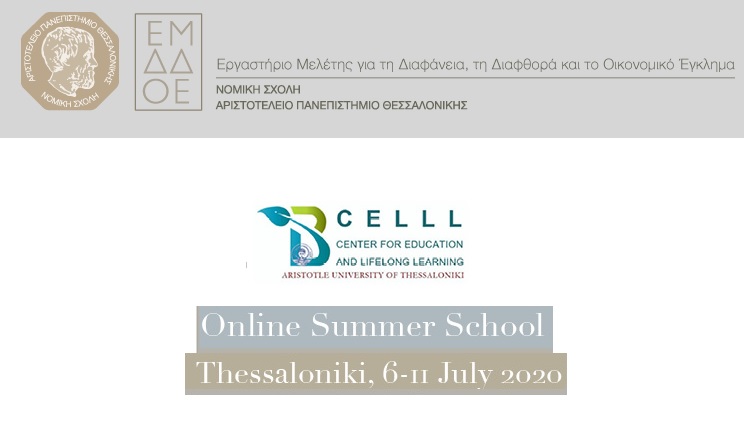Due to the unforeseeable circumstances caused by the worldwide pandemic of Covid-19 and the imposed movement restrictions, the Research Institute for Transparency, Corruption and Financial Crime, Faculty of Law – Aristotle University of Thessaloniki, decided that the 2020 Summer School will be conducted online on the planned dates. Our goal is to ensure thus the safe completion of the Summer School with the participation of the highest possible number of interested parties, as well as the course’s quality standards. We look forward to meeting you “via the Web” and discussing with you about the recent developments in the fields of financial crime, corruption and money laundering at a national, European and international level.
The 6-day intensive online courses will focus on ongoing developments of key issues in combating international fraud, corruption and money laundering, international and European anti-fraud mechanisms and procedures, etc. Recent developments to be discussed will include, inter alia, the directive on fraud against the EU financial interests, the Regulation on the European Public Prosecutor’s Office, the Criminal Law Anti-Money Laundering Directive, asset recovery and confiscation, corporate liability, corruption, etc. The classes will be live, taught with the help of a simultaneous teleconferencing system, so that the participants will have the chance to interact and participate in the discussion.
Speakers include:
- Prof. Pedro Caeiro, University of Coimbra, Portugal
- Dr. Peter Csonka, Head of Unit (Criminal Law) at European Commission DG Justice
- Prof. Thomas Elholm, University of Southern Denmark
- Prof. Eric Hilgendorf, University of Würzburg, Germany
- Prof. Maria Kaiafa-Gbandi, Aristotle University Thessaloniki, Greece
- Prof. Helmut Satzger, LMU University Munich, Germany
Read the detailed program and list of speakers
When?
6-11 July 2020.
Where?
Everywhere! The courses will be taught online. All courses are taught in English. Although applicants are not required to present an official certificate of language proficiency, they need to be fluent in English, so that they follow the courses and interact with fellow students.
Read more information how to apply




